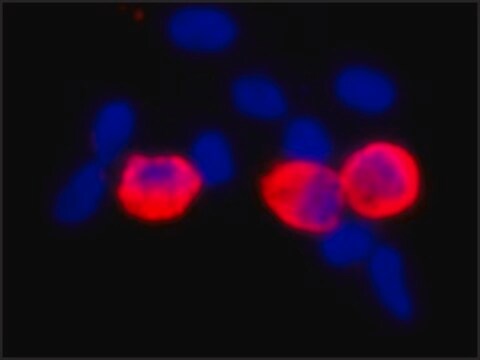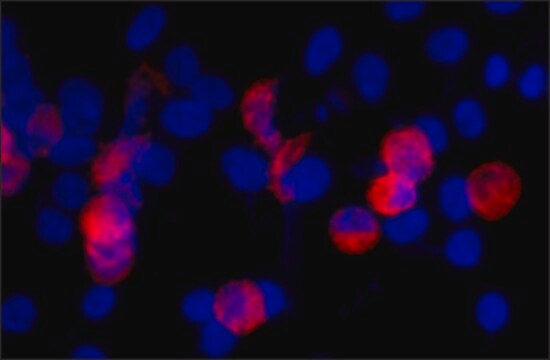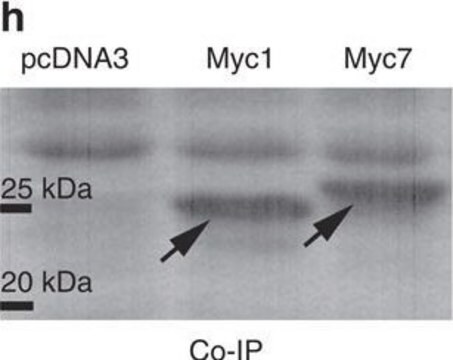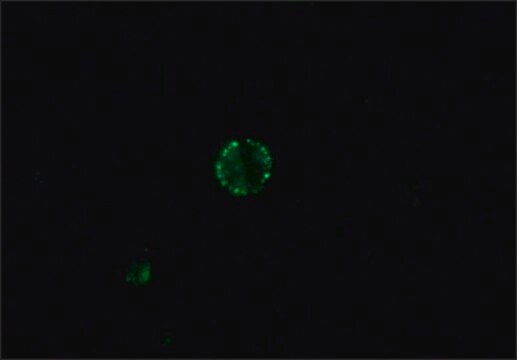推荐产品
生物源
mouse
品質等級
共軛
CY3 conjugate
抗體表格
purified immunoglobulin
抗體產品種類
primary antibodies
無性繁殖
9E10, monoclonal
形狀
buffered aqueous solution
物種活性
human
技術
direct immunofluorescence: 1:50 using formalin-fixed, paraffin-embedded human colon carcinoma tissue
UniProt登錄號
運輸包裝
wet ice
儲存溫度
2-8°C
目標翻譯後修改
unmodified
基因資訊
human ... MYC(4609)
正在寻找类似产品? 访问 产品对比指南
一般說明
Monoclonal Anti-c-myc (mouse IgG1 isotype) is derived from the 9E10 hybridoma produced by the fusion of mouse myeloma cells and splenocytes from an immunized BALB/c mouse. The c-Myc gene encodes a polypeptide with a predicted molecular weight of 49 kDa.
免疫原
人p62c-Myc蛋白的合成肽。
應用
Monoclonal Anti-c-MycCy3™ antibody produced in mouse has been used in:
- western blotting
- immunocytochemistry
- Immunofluorescence
生化/生理作用
The encoded protein is involved in cell proliferation, growth and apoptosis. The c-myc gene has been implicated in the development of a number of neoplasms in a variety of avian and mammalian species. The human c-myc protooncogene is the cellular homolog of the avian v-myc gene found in several leukemogenic retroviruses. Increased expression of the cellular oncogene c-myc has been described in a variety of human tumors, occurring by several different mechanisms, including gene amplification and chromosomal translocation.
外觀
Solution in 0.01 M sodium phosphate buffered saline containing 1% bovine serum albumin and 15 mM sodium azide.
法律資訊
Cy3 is a trademark of Cytiva
免責聲明
Unless otherwise stated in our catalog or other company documentation accompanying the product(s), our products are intended for research use only and are not to be used for any other purpose, which includes but is not limited to, unauthorized commercial uses, in vitro diagnostic uses, ex vivo or in vivo therapeutic uses or any type of consumption or application to humans or animals.
未找到合适的产品?
试试我们的产品选型工具.
儲存類別代碼
10 - Combustible liquids
水污染物質分類(WGK)
nwg
閃點(°F)
Not applicable
閃點(°C)
Not applicable
個人防護裝備
Eyeshields, Gloves, multi-purpose combination respirator cartridge (US)
Nir London et al.
Biochemistry, 51(29), 5841-5850 (2012-06-19)
Interactions between Bcl-2-like proteins and BH3 domains play a key role in the regulation of apoptosis. Despite the overall structural similarity of their interaction with helical BH3 domains, Bcl-2-like proteins exhibit an intricate spectrum of binding specificities whose underlying basis
Sanjib Dutta et al.
Journal of molecular biology, 398(5), 747-762 (2010-04-07)
Interactions among Bcl-2 family proteins are important for regulating apoptosis. Prosurvival members of the family interact with proapoptotic BH3 (Bcl-2-homology-3)-only members, inhibiting execution of cell death through the mitochondrial pathway. Structurally, this interaction is mediated by binding of the alpha-helical
A highly secreted sulphamidase engineered to cross the blood-brain barrier corrects brain lesions of mice with mucopolysaccharidoses type IIIA
Sorrentino NC, et al.
EMBO Molecular Medicine, 5(5), 675-690 (2013)
Marie Pierron et al.
The Journal of neuroscience : the official journal of the Society for Neuroscience, 36(24), 6525-6537 (2016-06-17)
Diffuse extrasynaptic neurotransmitter receptors constitute an abundant pool of receptors that can be recruited to modulate synaptic strength. Whether the diffuse distribution of receptors in extrasynaptic membranes is a default state or is actively controlled remains essentially unknown. Here we
Human MAMLD1 gene variations seem not sufficient to explain a 46, XY DSD phenotype
Camats N, et al.
PLoS ONE, 10(11), e0142831-e0142831 (2015)
我们的科学家团队拥有各种研究领域经验,包括生命科学、材料科学、化学合成、色谱、分析及许多其他领域.
联系技术服务部门






